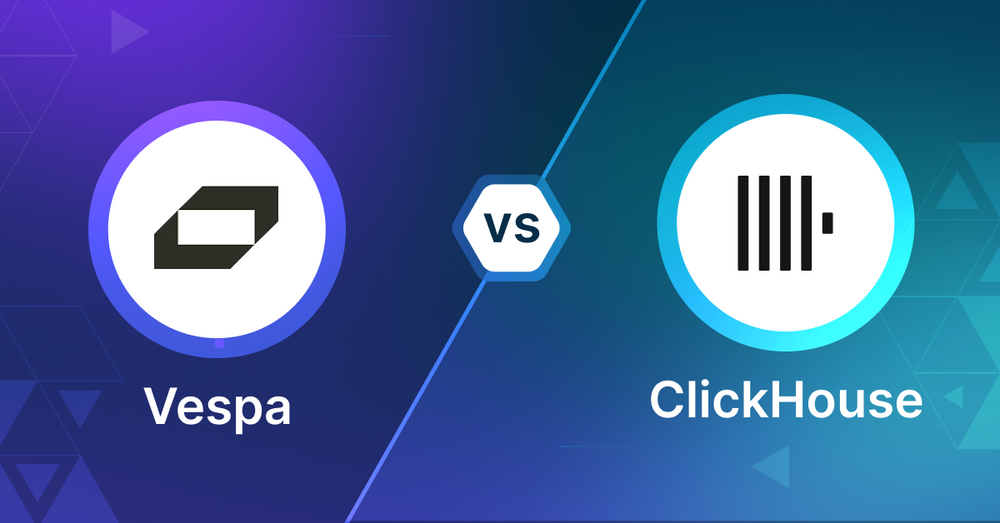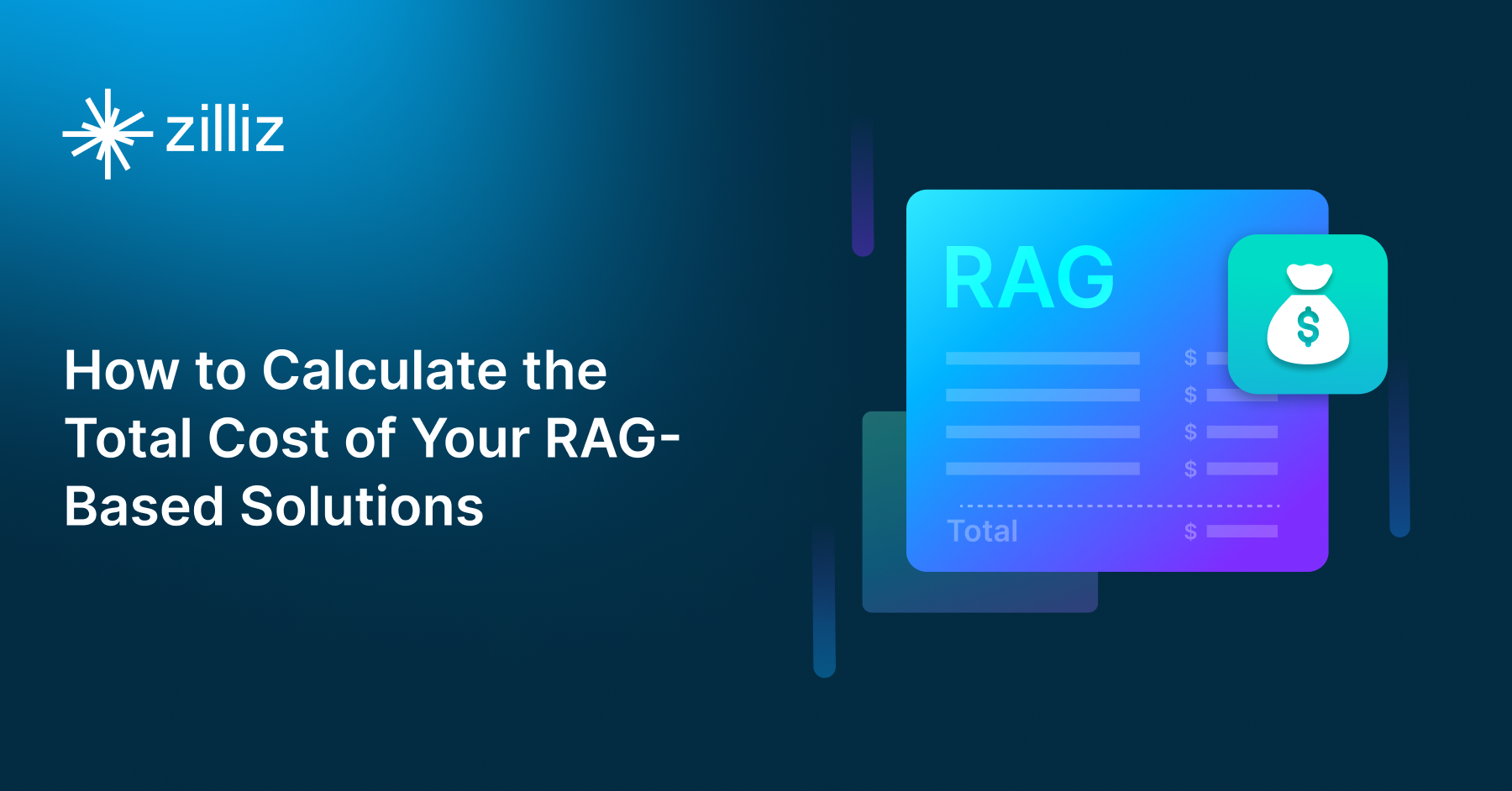Vespa vs ClickHouse Choosing the Right Vector Database for Your AI Apps

What is a Vector Database?
Before we compare Vespa and ClickHouse, let's first explore the concept of vector databases.
A vector database is specifically designed to store and query high-dimensional vectors, which are numerical representations of unstructured data. These vectors encode complex information, such as the semantic meaning of text, the visual features of images, or product attributes. By enabling efficient similarity searches, vector databases play a pivotal role in AI applications, allowing for more advanced data analysis and retrieval.
Common use cases for vector databases include e-commerce product recommendations, content discovery platforms, anomaly detection in cybersecurity, medical image analysis, and natural language processing (NLP) tasks. They also play a crucial role in Retrieval Augmented Generation (RAG), a technique that enhances the performance of large language models (LLMs) by providing external knowledge to reduce issues like AI hallucinations.
There are many types of vector databases available in the market, including:
- Purpose-built vector databases such as Milvus, Zilliz Cloud (fully managed Milvus)
- Vector search libraries such as Faiss and Annoy.
- Lightweight vector databases such as Chroma and Milvus Lite.
- Traditional databases with vector search add-ons capable of performing small-scale vector searches.
Vespa is a purpose-built vector database. ClickHouse is an open-source column-oriented database with vector search capabilities as an add-on. This post compares their vector search capabilities.
Vespa: Overview and Core Technology
Vespa is a powerful search engine and vector database that can handle multiple types of searches all at once. It's great at vector search, text search, and searching through structured data. This means you can use it to find similar items (like images or products), search for specific words in text, and filter results based on things like dates or numbers - all in one go. Vespa is flexible and can work with different types of data, from simple numbers to complex structures.
One of Vespa's standout features is its ability to do vector search. You can add any number of vector fields to your documents, and Vespa will search through them quickly. It can even handle special types of vectors called tensors, which are useful for representing things like multi-part document embeddings. Vespa is smart about how it stores and searches these vectors, so it can handle really large amounts of data without slowing down.
Vespa is built to be super fast and efficient. It uses its own special engine written in C++ to manage memory and do searches, which helps it perform well even when dealing with complex queries and lots of data. It's designed to keep working smoothly even when you're adding new data or handling a lot of searches at the same time. This makes it great for big, real-world applications that need to handle a lot of traffic and data.
Another cool thing about Vespa is that it can automatically scale up to handle more data or traffic. You can add more computers to your Vespa setup, and it will automatically spread the work across them. This means your search system can grow as your needs grow, without you having to do a lot of complicated setup. Vespa can even adjust itself automatically to handle changes in how much data or traffic you have, which can help save on costs. This makes it a great choice for businesses that need a search system that can grow with them over time.
ClickHouse: Overview and Core Technology
ClickHouse is an open-source OLAP database for real-time analytics with full SQL support and fast query processing. It’s great for analytical queries because of fully parallelized query pipeline and can do vector search fast. It has high compression (customizable through codecs) so can store and query big datasets. One of its main advantages is that it can handle multi-TB datasets without being memory bound so it’s a great tool for users with large vector data. Also supports filtering and aggregation on metadata, so you can query vectors and their metadata.
ClickHouse has vector search functionality through SQL where vector distance operations are just like any other SQL function. So you can combine it with traditional filtering and aggregation. Great for use cases where you need to query vector data along with metadata or other information. Also has experimental Approximate Nearest Neighbour (ANN) indices for faster (but approximate) matching. And exact matching through linear scan over rows with parallel processing for speed and efficiency.
ClickHouse is great for vector search when you need to combine vector matching with metadata filtering or aggregation. Especially for very large vector datasets that need to be processed in parallel across multiple CPU cores. ClickHouse is also good when you need SQL support and your vector dataset is too big to fit in memory-only indices. Also if you already have related data in ClickHouse or don’t want to learn another tool to manage millions of vectors, ClickHouse can save you time and resources. Fast parallelized exact matching and handling big datasets is what ClickHouse is good for, so it’s for advanced search users.
ClickHouse is a general purpose platform for vector search, especially for large datasets that need parallel processing and when you combine vector search with SQL-based filtering and aggregation. Not as good as specialized vector databases for small memory-bound datasets or high-QPS scenarios but can handle complex queries including metadata so great for developers who know SQL and need fast vector search.
Key Differences
Choosing the right vector search solution matters a lot. This comparison between Vespa and ClickHouse will help you understand the differences to make a decision for your use case.
Core Features
Vespa is a search engine that combines vector search, text search and structured data search in one platform. It can handle multiple vector fields per document and tensor operations so it’s suitable for complex search use cases.
ClickHouse takes a different approach as an OLAP database with vector search capabilities built into the SQL layer. It’s great for analytical queries and can process large vector datasets through the parallel query pipeline.
Search Methodology
Vespa’s search engine is built from the ground up for fast, real-time search. The C++ core engine manages memory efficiently so it can handle complex queries across different data types at the same time. The platform supports both approximate and exact nearest neighbor search methods.
ClickHouse implements vector search through SQL functions, treating vector operations as standard SQL operations. It offers exact matching through parallel linear scans and experimental Approximate Nearest Neighbor (ANN) indices. The SQL integration means you can combine vector searches with regular database operations seamlessly.
Data
Vespa is great for real-time updates and searches across multiple data types. The platform can handle multiple vector fields per document and complex tensor operations. It can process structured and unstructured data while keeping performance during real-time updates.
ClickHouse is impressive with large datasets through high compression ratios and custom codecs. It can process multi-TB datasets without memory constraints and full SQL support for complex data operations. It’s great with structured data and metadata so it’s perfect for analytical workloads.
Scalability and Performance
Vespa has automatic scaling through its distributed architecture. When you add nodes to your cluster, Vespa will distribute the data and process automatically. The system will keep performance consistent during data updates or high concurrent search loads so it’s perfect for production environments with varying workloads.
ClickHouse scales through parallel processing. The system can distribute queries across multiple CPU cores and nodes. It’s great for large scale batch processing and analytical workloads. This architecture allows for complex queries across large datasets.
Flexibility and Integration
Vespa has flexibility through custom ranking models and real-time model serving. The system has APIs for multiple programming languages and flexible document schema, so you can adapt the system to your use case.
ClickHouse has flexibility through full SQL support and integration with existing SQL based tools. It has custom functions and aggregations and supports multiple data formats natively. This SQL centric approach is perfect for teams with database expertise.
Ease of Use
Vespa has a steeper learning curve because of its unique architecture and configuration system. But it has comprehensive documentation and examples for multiple use cases so you can implement complex search solutions effectively.
ClickHouse is more approachable for teams already familiar with SQL as it extends standard SQL syntax for vector operations. The query language is well documented and follows standard database patterns, so the initial learning curve is lower for teams with SQL experience.
Cost
Both are open source but the operational cost differ based on resource requirements. Vespa requires more memory per node, dedicated search infrastructure and resources for real-time processing. ClickHouse needs more storage space and CPU resources for parallel processing but generally less memory than pure in-memory solutions. The final cost will depend on your use case, data volume and query patterns.
Security
Both have security features. Vespa has application level security with custom rules and filters, ClickHouse has SQL based access control and supports multiple authentication methods. Both can be configured to meet enterprise security requirements.
When to Choose Vespa
Vespa is the best choice when you need real-time search across multiple data types, especially when you need to combine vector search with text search and structured data queries. Its architecture is designed for scenarios that require immediate updates, complex ranking models and auto scaling, so it’s perfect for production environments where search quality and response time matter, like recommendation systems, personal search engines or content discovery platforms.
When to Choose ClickHouse
ClickHouse is good for analytical scenarios where you need to combine vector search with complex SQL queries and data analysis. It’s perfect for applications with multi-terabyte vector datasets that need parallel processing, especially if your team is already familiar with SQL and wants to integrate vector search into existing analytical workflows. Choose ClickHouse when you need to do vector similarity search along with complex aggregations and data transformations, like in data analysis platforms, large scale analytics systems or business intelligence applications.
Conclusion
The choice between Vespa and ClickHouse is simple, it’s all about your use case and operational requirements. Vespa is good at real-time search across multiple data types, auto scaling and complex ranking. ClickHouse is good at SQL based vector operations, parallel processing and handling big data. Your decision should be based on your data volume, update frequency, query patterns, team expertise and if real-time search performance or analytical capabilities with vector search is your priority.
Read this to get an overview of Vespa and ClickHouse but to evaluate these you need to evaluate based on your use case. One tool that can help with that is VectorDBBench, an open-source benchmarking tool for vector database comparison. In the end, thorough benchmarking with your own datasets and query patterns will be key to making a decision between these two powerful but different approaches to vector search in distributed database systems.
Using Open-source VectorDBBench to Evaluate and Compare Vector Databases on Your Own
VectorDBBench is an open-source benchmarking tool for users who need high-performance data storage and retrieval systems, especially vector databases. This tool allows users to test and compare different vector database systems like Milvus and Zilliz Cloud (the managed Milvus) using their own datasets and find the one that fits their use cases. With VectorDBBench, users can make decisions based on actual vector database performance rather than marketing claims or hearsay.
VectorDBBench is written in Python and licensed under the MIT open-source license, meaning anyone can freely use, modify, and distribute it. The tool is actively maintained by a community of developers committed to improving its features and performance.
Download VectorDBBench from its GitHub repository to reproduce our benchmark results or obtain performance results on your own datasets.
Take a quick look at the performance of mainstream vector databases on the VectorDBBench Leaderboard.
Read the following blogs to learn more about vector database evaluation.
Further Resources about VectorDB, GenAI, and ML
- What is a Vector Database?
- Vespa: Overview and Core Technology
- ClickHouse: Overview and Core Technology
- Key Differences
- When to Choose Vespa
- When to Choose ClickHouse
- Conclusion
- Using Open-source VectorDBBench to Evaluate and Compare Vector Databases on Your Own
- Further Resources about VectorDB, GenAI, and ML
Content
Start Free, Scale Easily
Try the fully-managed vector database built for your GenAI applications.
Try Zilliz Cloud for FreeKeep Reading

Optimizing Embedding Model Selection with TDA Clustering: A Strategic Guide for Vector Databases
Discover how Topological Data Analysis (TDA) reveals hidden embedding model weaknesses and helps optimize vector database performance.

Empowering Innovation: Highlights from the Women in AI RAG Hackathon
Over the course of the day, teams built working RAG-powered applications using the Milvus vector database—many of them solving real-world problems in healthcare, legal access, sustainability, and more—all within just a few hours.

How to Calculate the Total Cost of Your RAG-Based Solutions
In this guide, we’ll break down the main components of RAG costs, show you how to calculate these expenses using the Zilliz RAG Cost Calculator, and explore strategies to manage spending efficiently.
The Definitive Guide to Choosing a Vector Database
Overwhelmed by all the options? Learn key features to look for & how to evaluate with your own data. Choose with confidence.